e-SPACE Cardio-Renal-Metabolic 2023
Published: 25 March 2023
-
Views:
 13020
13020
-
Likes:
 7
7
-
Views:
 13020
13020
-
Likes:
 7
7
-
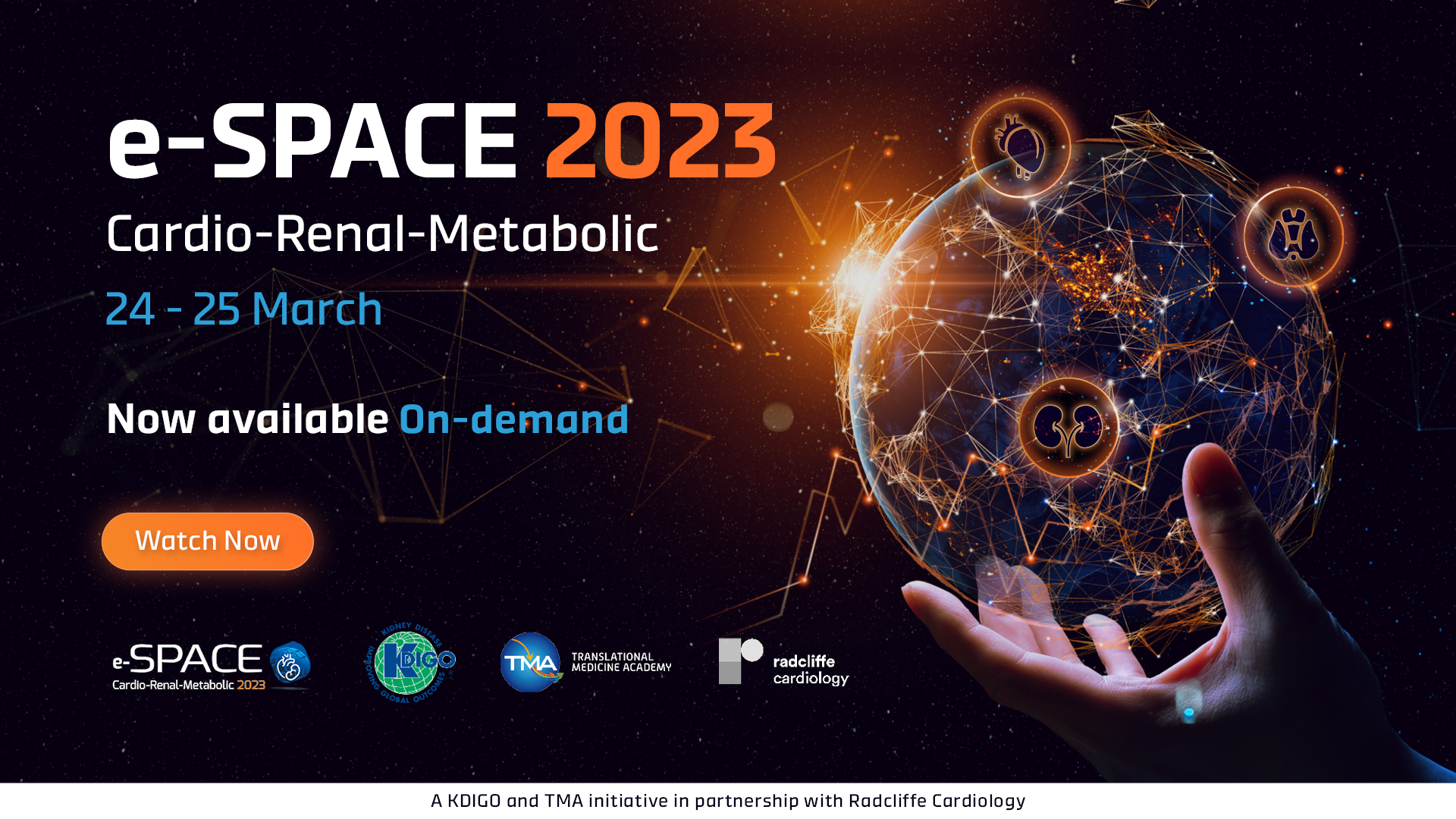 Up Next
Up Next -
 31m 5s
31m 5s -
 59m 17sPart 2 | Session 5 Plenary session 9 – Managing “metals”
59m 17sPart 2 | Session 5 Plenary session 9 – Managing “metals” -
 41m 30s
41m 30s -
 1h 2m 16sPart 2 | Session 7 Plenary session 10 – Management of diabetes with kidney disease
1h 2m 16sPart 2 | Session 7 Plenary session 10 – Management of diabetes with kidney disease -
 1h 3m 10sPart 2 | Session 8 Plenary session 11 – Managing frail and elderly patients
1h 3m 10sPart 2 | Session 8 Plenary session 11 – Managing frail and elderly patients -
 1h 1m 47sPart 2 | Session 9 Plenary session 12 – Managing end-stage disease: focus on QoL
1h 1m 47sPart 2 | Session 9 Plenary session 12 – Managing end-stage disease: focus on QoL
-
 58m 8sPart 1 | Session 1 Plenary session 1 – HFpEF Andrew JS Coats, Giuseppe Rosano, Eberhard Standl, María José Soler, Stefan Anker
58m 8sPart 1 | Session 1 Plenary session 1 – HFpEF Andrew JS Coats, Giuseppe Rosano, Eberhard Standl, María José Soler, Stefan Anker
-
 51m 57sPart 1 | Session 2 Satellite symposium – SGLT2 inhibitors in cardio-renal-metabolic patients – the perfect fit? (Supported by an educational grant from the Boehringer Ingelheim & Lilly Alliance) Stefan Anker, Paola Fioretto, Michel Jadoul
51m 57sPart 1 | Session 2 Satellite symposium – SGLT2 inhibitors in cardio-renal-metabolic patients – the perfect fit? (Supported by an educational grant from the Boehringer Ingelheim & Lilly Alliance) Stefan Anker, Paola Fioretto, Michel Jadoul
-
 56m 38sPart 1 | Session 3 Plenary session 2 – SGLT2 updates Andrew JS Coats, Hiddo Lambers Heerspink, Antonio Ceriello, Gianluigi Savarese, Christoph Wanner
56m 38sPart 1 | Session 3 Plenary session 2 – SGLT2 updates Andrew JS Coats, Hiddo Lambers Heerspink, Antonio Ceriello, Gianluigi Savarese, Christoph Wanner
-
 31m 38sPart 1 | Session 4 Meet the expert – Management of heart failure in real world clinical practice – insights from the REWOLUTION HF surveys Ewa Jankowska, Andrew JS Coats
31m 38sPart 1 | Session 4 Meet the expert – Management of heart failure in real world clinical practice – insights from the REWOLUTION HF surveys Ewa Jankowska, Andrew JS Coats
-
 58m 54sPart 1 | Session 5 Plenary session 3 – Weight management in CRM disease Luc Van Gaal, Wolfram Doehner, Milton Packer, Carel le Roux, Tammy Lyn Kindel, Ildiko Lingvay
58m 54sPart 1 | Session 5 Plenary session 3 – Weight management in CRM disease Luc Van Gaal, Wolfram Doehner, Milton Packer, Carel le Roux, Tammy Lyn Kindel, Ildiko Lingvay
-
 30m 11sPart 1 | Session 6 Meet the expert – Implementation patterns and challenges in HF care: insights from the EVOLUTION HF study (Supported by an educational grant from AstraZeneca) Orly Vardeny, Gianluigi Savarese
30m 11sPart 1 | Session 6 Meet the expert – Implementation patterns and challenges in HF care: insights from the EVOLUTION HF study (Supported by an educational grant from AstraZeneca) Orly Vardeny, Gianluigi Savarese
-
 1h 6m 3sPart 1 | Session 7 Plenary session 4 – Guidelines implementation for acutely ill patients Stephan Von Haehling, Mehriban Isgandar, Alexandre Mebazaa, Adriaan A Voors, Marat Fudim, Vijay Chopra
1h 6m 3sPart 1 | Session 7 Plenary session 4 – Guidelines implementation for acutely ill patients Stephan Von Haehling, Mehriban Isgandar, Alexandre Mebazaa, Adriaan A Voors, Marat Fudim, Vijay Chopra
-
 58m 41sPart 1 | Session 8 Plenary session 5 – Mineralocorticoids antagonists in CRM disease Javed Butler, Sunil Bhandari, Edgar V Lerma, Faiez Zannad, Janani Rangaswami, Gerasimos Filippatos
58m 41sPart 1 | Session 8 Plenary session 5 – Mineralocorticoids antagonists in CRM disease Javed Butler, Sunil Bhandari, Edgar V Lerma, Faiez Zannad, Janani Rangaswami, Gerasimos Filippatos
-
 25m 15sPart 1 | Session 9 Meet the expert – Single pill combination (SPC) in Cardiorenal metabolic (CRM) disease Stefan Anker, Muthiah Vaduganathan
25m 15sPart 1 | Session 9 Meet the expert – Single pill combination (SPC) in Cardiorenal metabolic (CRM) disease Stefan Anker, Muthiah Vaduganathan
-
 59m 5sPart 1 | Session 10 Plenary session 6 – Diuretics: old drugs, new data, new approaches Nisha Bansal, Christopher Wilcox, Wilfried Mullens, Areef Ishani, William T Abraham
59m 5sPart 1 | Session 10 Plenary session 6 – Diuretics: old drugs, new data, new approaches Nisha Bansal, Christopher Wilcox, Wilfried Mullens, Areef Ishani, William T Abraham
-
 1h 20sPart 2 | Session 1 Plenary session 7 – CRM drug management in patients with low eGFR and type 2 diabetes John J Atherton, Petar M Seferovic, John GF Cleland, Michael Böhm, Meg Jardine, Daniël van Raalte
1h 20sPart 2 | Session 1 Plenary session 7 – CRM drug management in patients with low eGFR and type 2 diabetes John J Atherton, Petar M Seferovic, John GF Cleland, Michael Böhm, Meg Jardine, Daniël van Raalte
-
 43m 41sPart 2 | Session 2 Satellite symposium – Management of CKD without diabetes – SGLT2 inhibitors, the new standard of care (Supported by an educational grant from AstraZeneca) Michel Jadoul, David Wheeler, Pinar Topsever
43m 41sPart 2 | Session 2 Satellite symposium – Management of CKD without diabetes – SGLT2 inhibitors, the new standard of care (Supported by an educational grant from AstraZeneca) Michel Jadoul, David Wheeler, Pinar Topsever
Overview
e-SPACE Cardio-Renal-Metabolic 2023 was the third edition of the annual global online conference that explores how leading experts, in cardiology, nephrology, and diabetology, are treating the interrelated diseases.
Course leadership Prof Stefan Anker (Berlin, DE), Dr Javed Butler (Texas, US), Prof Antonio Ceriello (Milan, IT), Prof Tara I Chang (California, US), Prof Ian de Boer (Washington, US), Prof Peter Rossing (Copenhagen, DK) and Prof Shelley Zieroth (Winnipeg, CA) lead an interactive programme of plenary sessions, meet the expert, case discussions and satellite symposium sessions focusing on the patient journey.
For the first time, e-SPACE Cardio-Renal-Metabolic 2023 brought together TMA’s mandate for the delivery of continuing professional development to healthcare professionals to achieve concordance with appropriate treatment plans, alongside KDIGO's mission to improve the care and outcomes of patients with kidney disease worldwide through the development and implementation of global clinical practice guidelines, with Radcliffe Cardiology’s goal to deliver cardiovascular knowledge to best support cardiovascular communities transform theory into practice.
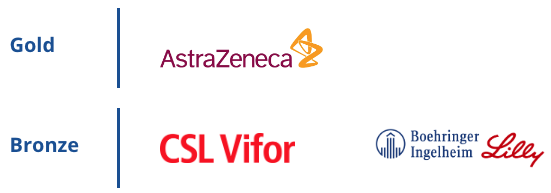
Learning Objectives
- Review the burden of diabetes, kidney disease and heart failure including morbidity, excess mortality, and reduced quality of life affecting individuals around the world
- Describe the complexity and interlink between the three conditions
- Discuss existing guidelines and best approaches for screening patients
- Review evidence-based management strategies for diabetes, cardiovascular disease, heart failure, kidney disease & obesity including SLGT2i, GLP-1RA, new non-steroidal mineralocorticoid receptor antagonists and other emerging therapies
- Foster cross-collaboration between other cardiorenal / metabolic specialists and primary care physicians and allied health care professionals in order to improve patients outcomes
Target Audience
- Cardiologists
- Nephrologists
- Diabetologists
- General Practitioners (GPs)
- HF Specialists
- Nurses, Pharmacists, and other Allied Healthcare Professionals
More from this programme
Part 1
Day One
Part 2
Day Two
Faculty Biographies

Peter Rossing
Clinical Professor
Prof Peter Rossing is a Clinical Professor at University of Copenhagen, Copenhagen, DK.
His interests include complications in diabetes with focus on renal and cardiovascular complications.
He has been involved in several intervention studies in patients with overt diabetic nephropathy aiming at improving the prognosis.
Prof Rossing is past president of the Danish Endocrine Society, and of the European Diabetic Nephropathy Study group and chairman of the Danish National Diabetes Registry.
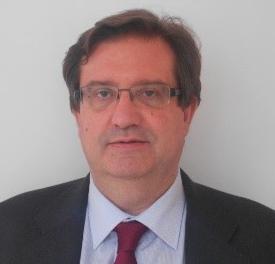
Antonio Ceriello
Head of Diabetes Department
Prof Antonio Ceriello is Head of Diabetes Department at IRCCS MultiMedica, Milan, IT.
He has chaired the International Diabetes Federation (IDF) committee for the development in 2008, and in the 2011 for the update of “Guideline for Management of Postmeal Glucose".
Prof Ceriello has been a Member of the Board for the development of the new “European Society of Cardiology (ESC) guidelines on diabetes, pre-diabetes, and cardiovascular diseases developed in collaboration with the EASD".
He has published over 450 original papers.
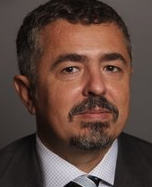
Apostolos G Tsapas
Professor of Medicine and Diabetes
Prof Apostolos G Tsapas is a Professor of Medicine and Diabetes at Aristotle University of Thessaloniki, Thessaloniki, Greece.
He is the Lead Investigator of the Clinical Research and Evidence-Based Medicine Unit at Aristotle University Thessaloniki, and Head of the Second Medical Department and the Diabetes Centre at Ippokratio Hospital Thessaloniki.
Prof Tsapas has expertise in evidence-based medicine and diabetes, and has been involved in the last three iterations (2012, 2015 and 2018) of the ADA/EASD guidelines for treatment of hyperglycemia in type 2 diabetes.
His main research interests include knowledge synthesis, evidence-based practice, patient-centred care and clinical decision-making in medicine and diabetes.
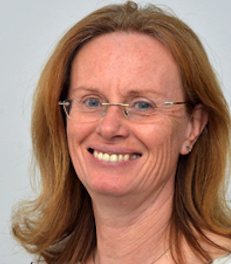
Melanie Davies
Director of the Leicester NIHR Biomedical Research Centre, Leicester, UK
Prof Melanie Davies is Director of the Leicester NIHR Biomedical Research Centre, Director of the Patient Recruitment Centre Leicester and a Professor in Diabetes Medicine at the University of Leicester, UK. She has published over 500 original articles in leading journals.
Professor Davies’ research interests include the causes, screening, prevention, self-management and treatment of type 2 diabetes mellitus. She has served as the PI for a number of large global studies in diabetes, obesity, sedentary behaviour and cardiovascular disease. In 2016 she was the recipient of a CBE for services to diabetes research.

John JV McMurray
Professor of Cardiology
Prof John McMurray is Professor of Medical Cardiology and Deputy Director of the Institute of Cardiovascular and Medical Sciences at the University of Glasgow, and honorary Consultant Cardiologist at the Queen Elizabeth University Hospital, Glasgow. A graduate of Manchester University, Prof McMurray completed postgraduate research at the University of Dundee.
Prof McMurray is a Fellow of the European Society of Cardiology (ESC), American College of Cardiology and American Heart Association as well as the medical Royal Colleges in Edinburgh and Glasgow and the Royal Society of Edinburgh and UK Academy of Medical Sciences.






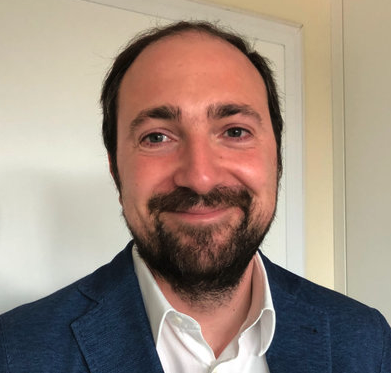
Comments